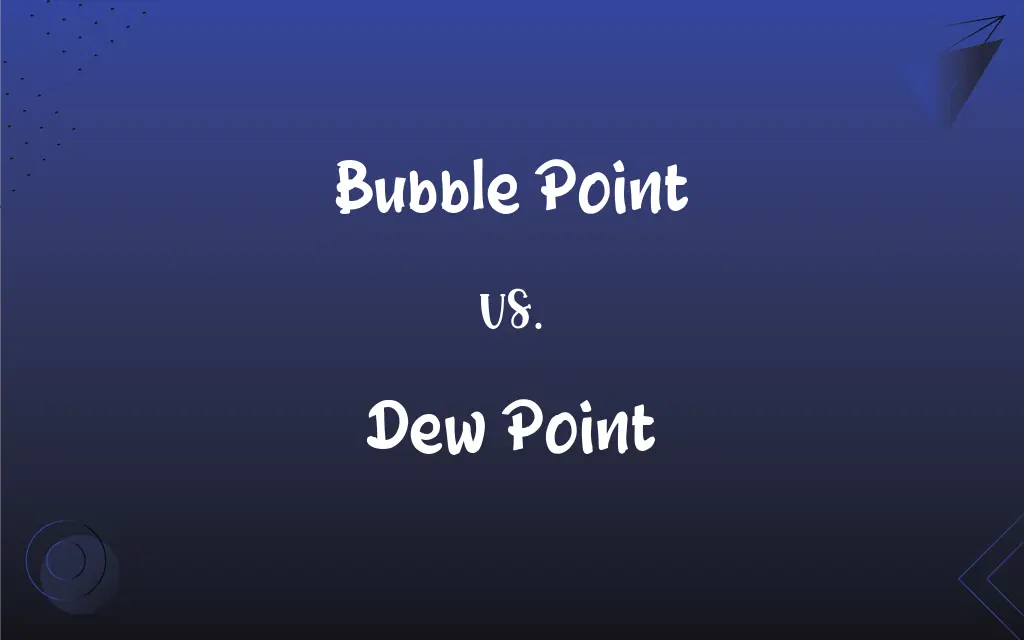Bubble Point vs. Dew Point: What's the Difference?
Edited by Aimie Carlson || By Harlon Moss || Published on December 21, 2023
The bubble point is the temperature at which a liquid mixture starts to vaporize, while the dew point is the temperature at which vapor starts to condense into liquid.

Key Differences
The bubble point is the temperature at which the first bubble of vapor forms in a liquid mixture during heating. The dew point is the temperature at which vapor begins to condense into liquid during cooling.
In a liquid mixture, the bubble point signifies the start of the transition from liquid to vapor phase. The dew point marks the beginning of condensation in a gaseous mixture.
Both bubble point and dew point are dependent on the pressure of the system. At higher pressures, both temperatures increase.
The exact temperatures of bubble and dew points are sensitive to the composition of the mixture, changing with different ratios of components.
The bubble point is critical in distillation processes to determine when boiling begins. The dew point is important in meteorology for predicting weather and in industries to prevent condensation in processes.
ADVERTISEMENT
Comparison Chart
Definition
Temperature at which a liquid starts to vaporize.
Temperature at which vapor starts to condense.
Phase Change
Liquid to vapor.
Vapor to liquid.
Relevance
Indicates the onset of boiling in a liquid mixture.
Indicates the onset of condensation in a gas mixture.
Pressure Dependency
Increases with higher pressure.
Increases with higher pressure.
Application
Used in distillation and chemical processing.
Important in meteorology and preventing condensation.
ADVERTISEMENT
Bubble Point and Dew Point Definitions
Bubble Point
Specific temperature for phase transition from liquid to vapor.
At the bubble point, the first vapor bubble is observed.
Dew Point
Reflects humidity levels in the atmosphere.
A high dew point means a more humid climate.
Bubble Point
Reflects the boiling temperature of a liquid mixture.
The bubble point varies with the composition of the liquid.
Dew Point
The temperature at which air becomes saturated with moisture.
The dew point indicates when dew forms on grass.
Bubble Point
Changes with system pressure.
Increasing pressure raises the bubble point of a liquid.
Dew Point
Specific temperature where vapor condenses into liquid.
Reaching the dew point causes fog formation.
Bubble Point
A critical parameter in designing distillation processes.
Distillation columns are designed considering the bubble point of the mixture.
Dew Point
Important in preventing unwanted condensation in processes.
Maintaining temperatures above dew point prevents condensation in pipelines.
Bubble Point
The temperature where liquid starts boiling.
The bubble point helps determine the boiling range of crude oil.
Dew Point
Used to forecast weather and precipitation.
Meteorologists use dew point to predict fog and dew.
Dew Point
The temperature at which dew begins to form. It varies with the humidity and temperature of the atmosphere.
FAQs
Why is bubble point important in distillation?
Bubble point determines the boiling start of components in a mixture.
What is the dew point?
Dew point is the temperature at which vapor condenses into liquid.
Why is dew point significant in climate control?
It's important for managing moisture and avoiding condensation in buildings.
Does pressure affect bubble point?
Yes, higher pressure typically increases the bubble point.
Is dew point always the same as ambient temperature?
No, dew point can be different from the ambient temperature.
What role does dew point play in meteorology?
It helps in predicting fog, dew, and overall humidity conditions.
What is the bubble point?
Bubble point is the temperature at which a liquid mixture begins to boil.
How does dew point relate to weather?
Dew point indicates humidity and potential for dew or fog formation.
Can bubble point vary with mixture composition?
Yes, bubble point changes with the composition of the liquid mixture.
What factors influence bubble point in a system?
Factors include pressure, temperature, and mixture composition.
Is the bubble point the same at different altitudes?
No, altitude can affect pressure, which in turn affects bubble point.
How does dew point affect human comfort?
Higher dew points feel more humid and can affect comfort levels.
Can bubble point be used to identify substance purity?
Yes, variations in expected bubble point can indicate impurities.
Can dew point be affected by air pollution?
Yes, pollutants can affect moisture levels and thus dew point.
How is bubble point measured?
Bubble point is measured using specialized instruments in a controlled environment.
Are bubble points consistent for all liquids?
No, different liquids have different bubble points.
Why is monitoring dew point important in industrial settings?
To prevent condensation-related issues in equipment and pipelines.
What's the relationship between dew point and relative humidity?
Dew point and relative humidity are both measures of atmospheric moisture.
Does dew point indicate exact precipitation?
No, dew point indicates potential for dew or fog, not precise precipitation.
Is the bubble point relevant in all chemical processes?
It's most relevant in processes involving phase changes, like distillation.
About Author
Written by
Harlon MossHarlon is a seasoned quality moderator and accomplished content writer for Difference Wiki. An alumnus of the prestigious University of California, he earned his degree in Computer Science. Leveraging his academic background, Harlon brings a meticulous and informed perspective to his work, ensuring content accuracy and excellence.
Edited by
Aimie CarlsonAimie Carlson, holding a master's degree in English literature, is a fervent English language enthusiast. She lends her writing talents to Difference Wiki, a prominent website that specializes in comparisons, offering readers insightful analyses that both captivate and inform.






































































